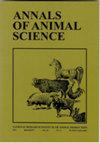饲料中添加外源蛋白酶在低鱼粉水产饲料中的作用综述
IF 2.2
4区 农林科学
Q2 AGRICULTURE, DAIRY & ANIMAL SCIENCE
引用次数: 0
摘要
用经济、营养的鱼粉替代品(包括植物和动物蛋白成分)替代鱼粉已成为全球研究的重点。然而,在这些替代品中存在几种抗营养因子(ANFs)可能会损害鱼类对营养物质的利用。在饲料中添加外源蛋白酶是提高这些替代蛋白质营养物质消化率的有效途径。蛋白酶是一种蛋白质消化酶,它催化复杂的蛋白质大分子水解成更简单的氨基酸。外源蛋白酶的补充可刺激鱼类内源蛋白水解酶的活性,促进营养物质的消化和吸收。本文综述了各种鱼类的最佳蛋白酶添加水平及其对鱼类生长性能、营养物质消化率、肠道形态、消化酶活性、全身组成、理化参数、免疫和基因表达的有益影响。此外,还讨论了外源蛋白酶与有机酸和益生菌的相互作用。综上所述,在鱼饲料中添加外源蛋白酶是解决鱼粉替代品营养利用率不高的可行方法。然而,在目前的知识中存在着重要的空白,特别是关于补充蛋白酶对动物蛋白的影响,因为大多数研究都集中在补充蛋白酶对植物蛋白作为FM替代品的影响上。此外,进一步研究添加蛋白酶对鱼类消化酶活性、免疫、肠道微生物和抗氧化参数的影响,将为更好地了解蛋白酶的作用方式提供基础。在这些领域的知识匮乏限制了蛋白酶补充作为饲料添加剂在水产养殖部门的范围。本文章由计算机程序翻译,如有差异,请以英文原文为准。
Roles of dietary supplementation of exogenous protease in low fishmeal aquafeed: a mini review
Abstract The replacement of fishmeal (FM) with economical and nutritious FM alternatives including plant and animal-based protein ingredients has become a global research priority. However, the presence of several anti-nutritional factors (ANFs) in these alternatives may impair nutrient utilization in fish. The supplementation of exogenous protease as feed additives could be an effective approach to improve the nutrient digestibility of these alternative proteins. Proteases are protein-digesting enzymes that catalyze the hydrolysis of complex protein macromolecules into simpler amino acids. Exogenous protease supplementation stimulates the activities of endogenous proteolytic enzymes for better nutrient digestion and absorption in fish. This review article summarizes the optimum protease supplementation levels in various fish species and its beneficial effects on growth performance, nutrient digestibility, intestinal morphology, digestive enzyme activities, whole-body composition, physiochemical parameters, immunity, and gene expression of fish. Moreover, the interactive effects of exogenous protease with organic acids and probiotics are also discussed. Overall, the supplementation of exogenous protease in fish feed is a viable solution for poor nutrient utilization of FM alternatives. Important gaps, however, exist in the current knowledge, particularly with regard to the effect of protease supplementation in animal-based proteins as most of the studies have focused on the effect of protease supplementation on plant-based proteins as FM alternatives. Moreover, additional studies focused on the effect of protease supplementation on the digestive enzyme activities, immunity, gut microbes and antioxidant parameters of fish will provide the basis for a better understanding of the mode of action of protease. The scarce knowledge in these areas limits the scope of protease supplementation as a feed additive in the aquaculture sector.
求助全文
通过发布文献求助,成功后即可免费获取论文全文。
去求助
来源期刊

Annals of Animal Science
农林科学-奶制品与动物科学
CiteScore
4.00
自引率
5.30%
发文量
138
审稿时长
6-12 weeks
期刊介绍:
Annals of Animal Science accepts original papers and reviews from the different topics of animal science: genetic and farm animal breeding, the biology, physiology and reproduction of animals, animal nutrition and feedstuffs, environment, hygiene and animal production technology, quality of animal origin products, economics and the organization of animal production.
 求助内容:
求助内容: 应助结果提醒方式:
应助结果提醒方式:


